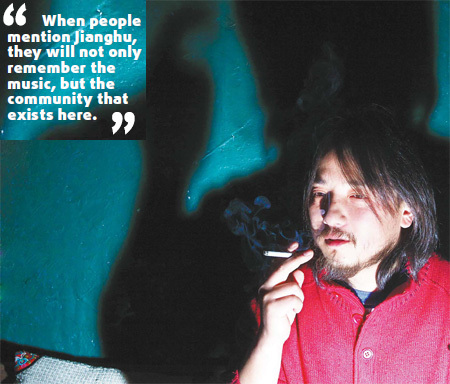Top Stories
The musician and his bar
By Christine Laskowski (China Daily)
Updated: 2009-11-30 10:59
 Jianghu Jiu Bar co-founder Tian Xiao.[China Daily] |
Jianghu Jiu Bar, one of the best and most respected small venues to see local live music in Beijing, celebrated its third anniversary last Sunday.
Located in Dongmianhua hutong between Jiaodaokou and Nanluoguxiang, it is a place people hardly stumble into. But once introduced, the music, the atmosphere and delicious 25-yuan glasses of German beer will be just a few of your reasons for coming back.
The bar's co-founder and manager Tian Xiao, is a well-known saxophone player in the Beijing music scene.
Tian said that how he came to open up the bar is a secret, but that he met a benefactor in Beijing and they both agreed about the bar concept: comfortable, not very luxurious, and open, where people can communicate freely.
"From the beginning I had an image in my head of what it would look like and that was this," he said.
"What makes the bar different is that it's not about the furniture, it's about the music, and that's the most important thing," he said.
"For example, this band," he pointed to the band on stage in the next room, playing catchy bossa nova rock. "They write their own songs and one of their songs is called Jianghu. People feel attached to this place."
Some celebrities like to choose this bar for interviews. Well-respected musicians, like Sa Dingding, in addition to stars from China Idol, are his friends.
"They live in other cities but when they come to Beijing they come here," he said.
Tian was born in a remote village in Guizhou province to parents originally from Harbin, and did not pick up the saxophone until college.
"My older brother played trumpet, so I tried learning it for a few days but it was really hard," Tian recalled.
"My brother's friend played sax, so I gave it a shot. I found the instrument itself was very interesting. That was initially what drew me to it."
After studying accounting for a year, Tian dropped out of college to study the saxophone seriously.
"I liked to play sax and sports," he said. "I just wasn't into school."
"And the girls were ugly," he added with a chuckle.
In the beginning, Tian set out to get his start as a musician in local bars, but they turned him down, he said.
"I listened to a lot of Kenny G. then," Tian said. "But there was little else. There wasn't a lot of access to good music. I mean, I didn't know the difference until I came to Beijing. It was here that I was introduced to Charlie Parker, Miles Davis, Louis Armstrong, Nirvana, The Beatles, Queen.
"Beijing opened up my mind to different kinds of music. "
As part of the rock wave in the 1980s and 1990s in China that produced gods of Chinese rock like Cui Jian, and the bands Black Leopard and Tang Dynasty, Tian Xiao came to Beijing in 1996 because, as he put it, he "wanted the freedom to be."
"Because Beijing is the center for musicians, a different kind of music made by a different kind of people."
But it was not easy at first. Low on money, he lived with friends in the dorm at Qinghua University and ate at the cantine until he was discovered two months later and kicked out.
But by then he saw his first live jazz performance with Cui Jian and saxophonist Liu Yuan.
"I had a lot of trouble finding the place," Tian recalled. "And then when I got there, there was a 30-yuan cover, plus I had to buy a beer. So I had no money left to even take the bus home."
"But after the performance, I was very excited," he continued.
"It was my first time to see such a performance. The place was near Sanyuanqiao and so I had to walk for several hours back to Tsinghua in the snow.
"But I walked slowly. It was one of the happiest times in my life. I felt so fulfilled."
By 2005, Tian had linked up with Zhou Yunpeng, a blind musician and guitarist, and Xiao Li, another folk singer and musician for a tour through northwestern part of China and finally Tibet, which had a profound effect on him.
When asked where the name "Jianghu" comes from, Tian said that means big river, but what that represents to him is something other than the city lifestyle as well as "a certain freedom that comes with wandering and being open to things".
"When people mention Jianghu they will not only remember the music, but the community that exists here," he said.









